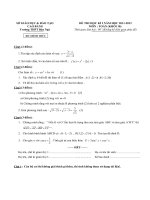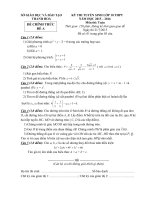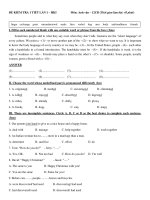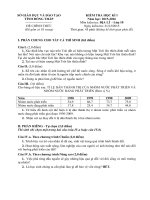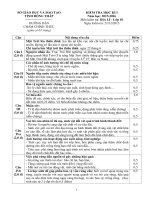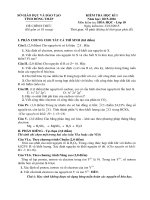- Trang chủ >>
- Đề thi >>
- Đề thi lớp 10
DE THI MON TIENG ANH 10 HKI NAM HOC 2015 2016 CHINH THUC MA 123
Bạn đang xem bản rút gọn của tài liệu. Xem và tải ngay bản đầy đủ của tài liệu tại đây (154.44 KB, 3 trang )
SỞ GIÁO DỤC VÀ ĐÀO TẠO
TỈNH ĐỒNG THÁP
ĐỀ CHÍNH THỨC
(Đề gồm có 03 trang)
KIỂM TRA HỌC KỲ I
Năm học: 2015-2016
Môn kiểm tra: TIẾNG ANH – LỚP 10
Ngày kiểm tra: 24/12/2015
Thời gian: 45 phút (không kể thời gian phát đề)
Mã đề thi 123
Họ, tên thí sinh:.....................................................................Số báo danh: .............................
Section A (6,0 points)
Listen to the conversation twice and mark the best answer for each of the following
questions.
Question 1: What does Carlos hate?
A. shopping
B. football
C. movies
D. museums
Question 2: When is the football match?
A. Saturday morning
B. Sunday morning
C. Sunday afternoon
D. Saturday afternoon
Question 3: Where are they going to eat on Saturday evening?
A. at home
B. in an Indian restaurant
C. in a Chinese restaurant
D. in a Korean restaurant
Question 4: What are they going to do on Sunday morning?
A. go for a drive
B. go to the zoo
C. go to the museum
D. get up late
Listen to the conversation twice and decide whether the following sentences are True (T) or
False (F). Write your answer on the answer sheet.
Question 5: She took an evening tour of the city.
_________
Question 6: She visited a small history museum.
_________
Question 7: The tour was not very expensive.
_________
Question 8: The tour guide was not helpful.
_________
Mark the letter A, B, C, or D on your answer sheet to indicate the correct answer to each of
the following questions.
Question 9: When we were on the phone, the crossed line was _______ because of the wrong
connection.
A. interrupted
B. obtained
C. calculated
D. bettered
Question 10: Look at that car! It _______that tree.
A. hits
B. is hitting
C. will hit
D. is going to hit
Trang 1/3-Mã đề thi 123
Mark the letter A, B, C, or D on your answer sheet to indicate the underlined part that needs
correction in each of the following questions.
Question 11: Unless Mary doesn’t have enough money, she can’t make a trip to Dalat.
A
B
C
D
Question 12: The young is not fully aware of the importance of learning English.
A
B
C
D
Mark the letter A, B, C, or D on your answer sheet to indicate the word that differs from the
other three in the position of primary stress in each of the following questions.
Question 13: A. typical
B. romantic
C. glorious
D. comedy
Read the following passage and mark the letter A, B, C, or D on your answer sheet to
indicate the correct word or phrase that best fits each of the numbers blanks.
John Logie Baird, ___(14)____ is called “the father of television”, was born in Scotland
in 1888. He became an ___(15)____ at the age of 26. His first inventions were electrically heated socks and air-filled shoes, but these were not very successful.
However, in 1923, he became interested in the idea of pictures by radio. He worked for
several months, and the following year he succeeded ___(16)____ transmitting the first
‘television’ picture a few meters across the room.
Baird’s ‘television’ was not very clear, but people were very interested and he tried
___(17)____ it better. In 1926, he showed it to the public at the Royal Society. In 1928, he
transmitted the first picture across the Atlantic and in 1929, the BBC and the German post
office began to broadcast TV with his system.
Question 14: A. who
B. which
C. whom
D. that
Question 15: A. invent
B. invented
C. inventor
D. invention
Question 16: A. on
B. for
C. in
D. at
Question 17: A. make
B. making
C. made
D. to make
Mark the letter A, B, C, or D on your answer sheet to indicate the word(s) OPPOSITE in
meaning to the underlined word(s) in each of the following questions.
Question 18: If the roads are widened, cars and lorries can get to our village.
A. broadened
B. flooded
C. narrowed
D. grown
Read the following passage and mark the letter A, B, C, or D on your answer sheet to
indicate the correct answer to each of the questions.
In the 1960s, computers began to be used widely in industry for many purposes. From
the beginning, stored program computers were applied to business problems. Because the
continual reductions in the costs and size, computers have been gradually used in smaller
organizations. Moreover, thanks to the invention of the microprocessor in the 1970s, it has
become possible to produce inexpensive computers. In the 1980s, personal computers became
popular for many tasks, including book-keeping, writing and printing documents, calculating
forecasts and other repetitive mathematical tasks. As computers have become less expensive,
they have been used extensively in the creative arts as well. Sound, pictures and videos are
now created and edited by computers.
Trang 2/3-Mã đề thi 123
Today, it is almost rare to find a powered mechanical device not controlled by a computer.
Perhaps the most famous computer-controlled mechanical devices are robots. Industrial robots
have become common in mass production.
Question 19: Which is NOT mentioned in the text?
A. Films
B. agriculture
C. industry
D. mathematics
Question 20: Thanks to _______, computers have become inexpensive
A. robots
B. calculations
C. documents
D. microprocessors
Question 21: The word extensively has a close meaning to _______.
A. inexpensively B. carelessly
C. widely
D. cheaply
Question 22: Robots _______.
A. are controlled by a computer program
B. haven’t been invented yet
C. aren’t controlled by a computer program
D. haven’t been common in mass production
Mark the letter A, B, C, or D on your answer sheet to indicate the word whose underlined
part differs from the other three in pronunciation in each of the following questions.
Question 23: A. return
B. teacher
C. parents
D. persuade
Mark the letter A, B, C, or D on your answer sheet to indicate the word(s) CLOSEST in
meaning to the underlined word(s) in each of the following questions.
Question 24: We receive information from radio through ears.
A. orally
B. visually
C. aurally
D. usually
Section B (2,0 points)
I. Finish each of the following sentences in such a way that it means the same as the
sentence printed before it. Write your answers on your answer sheet. (0,5 point)
Question 1: He passed the exam with high grades. This made everybody in the family pleased.
He______________________________________________________________
Question 2: The man has just sent the children to school.
The children ______________________________________________________
Question 3: Peter left for London two weeks ago.
When ___________________________________________________________?
Question 4: She said to me “I will take you to the restaurant.”
She told me _______________________________________________________
II. Write a paragraph (60 – 80 words) about your favorite subject.
The following prompts might be helpful to you.
- What’s your favorite subject?
- How long have you learnt it?
- Why do you like studying it?
THE END.
Trang 3/3-Mã đề thi 123
